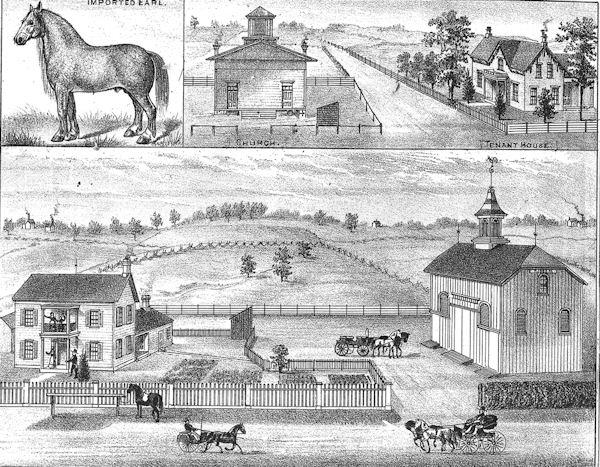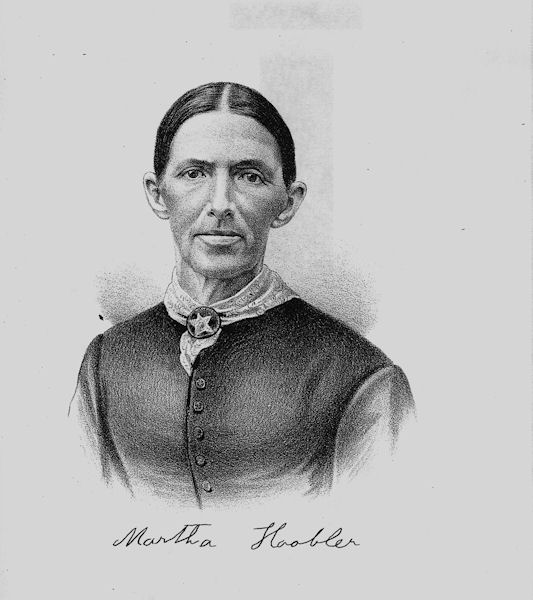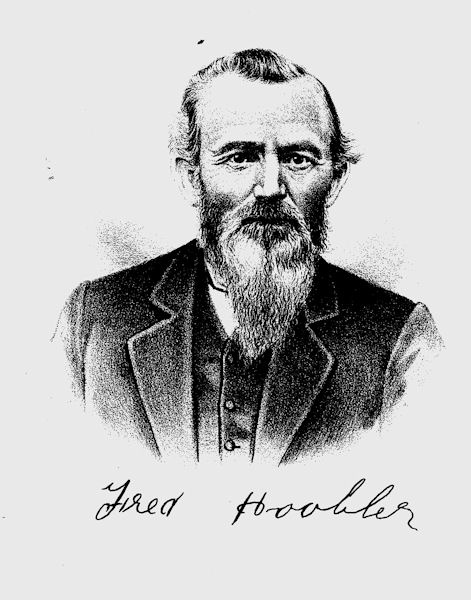
The Hancock-Henderson Quill, Inc.
The Wisdom of Barnyard Bruke
Greetings my friends from down here in farm country, where the hoot owls roost with the chickens. May this letter find all is well with you and yours and God's rich blessings sprinkled liberally in your territory as it is in mine.
Back in the early part of farming in Illinois, rural living was much different than it is today. Down in the back side of "skunk hollow" far back in the lane, beside Cornelius Farkwad's farm was a family of Hooblers by name, Fred and Martha Hoobler. Grandparents three times removed to my wife. They was slow in recovering from the big depression before the turn of the century and had grown accustomed to not using shoes during most of the "hard times".
Couldn't afford the leather and in fact some of their young folks had never even heard of shoes, seeing as how the depression started before they was born and lasted for so long for farm folk. Besides they was nigh near isolated, given their proximity to Skunk Hollow and the length of lane back into their patch of wood located on their farm.
Fred and Martha had ten children, 5 boys, 5 girls and two children died in infancy. Living children were Mattie, Susan, Hattie, Eben, Allen, Birdiett, Myrtie Florence, Freddie J., Jessie, and Gussie. There were few idlers in that family either among the young or old of that time and even for that locality. You see, they were Newtown Township folk, the same as myself.
They were taught to make themselves useful sowing, reaping and chores of crops and animals on their parents farm.
Martha Hoobler was a lady eminently fitted to be a companion of her husband, Fred, and with him takes a lively interest in the careful training and education of their children.
They were given the best advantages consistent with the means and standing of their father, which at that time did not include shoes.
Mr. Hoobler had the satisfaction of knowing that although his part in life may not have been widely different from that of scores of his fellow citizens, he had secured the good will and esteem of those around him, and endeavored in all his conduct to observe the precepts of the Golden Rule.
An interesting event happened to the Hoobler family. A passing salesman left a footprint in the mud near their farmstead.
Those young Hoobler boys found and started studying that footprint, but nobody could tell what kind of animal left its track. One of the boys, being right smart, built a pen around that footprint and charged one cent for his cousins just to come look at it!
Once the boys got older they were able to have shoes but only for special occasions.
One of the lads went to school proudly wearing his first pair of shoes. His walk to school was several miles, as was true for most young scholars in those days.
His shoes caused his feet to hurt so much, because of the unfamiliarity of their use, that he developed a severe limp. As he walked into the one-room schoolhouse, the teacher took note of his new shoes and proclaimed, "Young man, you've got your shoes on the wrong feet!" The young Hoobler boy quickly explained, "Sorry ma'am, but these is the only feet I've got, and besides they are too small for my brothers feet, at this time!"
At another time, two of the Hoobler boys took a box of vegetables to town to raise some cash. Hoobler boys barely knew which direction town was and for sure it was nowhere any self respecting young farm boy should traverse to. Whilst in town, they was shocked and wide-eyed to see most folks wearing shoes.
After studying the situation for a spell, and not knowing what day of the week it was, they finally reasoned they must have made the serious mistake of coming to town on Sunday to do their trading.
One time when Fred Hoobler was in town, a traveling out-of-town city-slicker, quizzed the father of all Hooblers as to the extent of his education. The traveler asked Mr. Hoobler, "How far did you go in school?" Mr. Hoobler replied "about 5 miles."
The out-of-towner then indignantly proclaimed to the elder barefoot Hoobler, "No! I mean what grade?"
Mr. Hoobler proudly proclaimed, "Pretty steep!"
Now Mrs. Hoobler was a chapter in herself. It was often said by city folk that what she lacked in beauty was more than made up in gentleness."
But, my what a fine wife and mother she was, raisen a family that was second to none without any of today's modern conveniences.
Her tasks included candle-making, caring for ten children, carrying water, chopping wood, keeping a supply of cobs for the cook stove, clothes washing, collecting honey, cooking, churning, doctoring, food preparation, gardening, grinding corn into meal, hoeing corn, knitting (socks, mittens, scarves), weaving, stuffing mattresses, soap-making, rope-making, putting up preserves, milking, herb collecting, making dinners for all the various work crews, threshing, haying, shelling, ice cutting, wood cutting, and setting the table, just to name a few.
She made her dresses and those for her daughters out of used feed sacks. And right proud they were if the feed sack happened to carry a pattern of some sort.
She mended socks, repaired clothes, cooked, baked and did all the chores with the poor light of a kerosene lamp.
Unless the temperature was below zero, women of that era hung the fresh washed clothes on the clothesline that often ran from near the house to almost as far as the outhouse. Before hanging the clothes, a cloth was always ran along each wire line to remove any rust that may have accumulated since the last washday.
A clothesline filled with newly washed clothes was quite a sight: white sheets blowing in the breeze, rows of socks and mother's "unmentionables" carefully hung on the line so that sheets and shirts would shield them from any gawking passerby.
A farm-wife of yesteryear had the same look of satisfaction on her face when Monday's washing was done as her husband had when finished shocking a field of oats or digging a patch of potatoes.
It was a farm person's quiet reward for hard work and a job completed.
In addition to all of this hard work, Martha was able to treat the elder Mr. Hoobler in a kindly and sufficient manner. Come to think of it, as a reflection back into those hard times, she was a special woman in her own right, even though she was tough as leather when the occasion required it. Had to be, to put up with that Hoobler clan.
Fred Hoobler had an interesting experience with the banker in his small town, when he went to borrow for shoes.
The banker asked that he fill out a financial statement as was standard procedure.
He didn't have anything for current assets so he put in fifty dollars for his old collie farm dog. Fred reasoned that would be enough collateral to buy Sunday best shoes for all the family.
But, the banker questioned the value severely as most dogs was free in those days and if you ever bought a dog, 50 cents to $1 was plenty to pay and then you should be careful that no one would find your eccentric spending out.
As you would suspect, the banker questioned Fred's stated value for his dog. But Fred had an answer for the banker's question as to how Fred felt his dog was worth $50. Fred stated boldly that he knew the dog was surely worth that for he had traded two $25 farm cats for that Collie.
The small town banker, gave Fred the money for the shoes based on ingenuity rather than question him in further.
Well, I have reminisced long enough. I had hopes of telling of observing my first man-fight, skunk-battle, and snake-scare. Maybe sometime I will tell you of old Scully Web down in Skunk Hollow and how he was tarred and feathered where the "hard-road" now is tared.
But for now friends, it is time for all good fellows in Hancock and Henderson counties to get to work and try and earn their keep for the day.
See ya later.
Your neighbor,
Barnyard Bruke

Hoobler Farm

Martha Hoober

Fred Hoobler